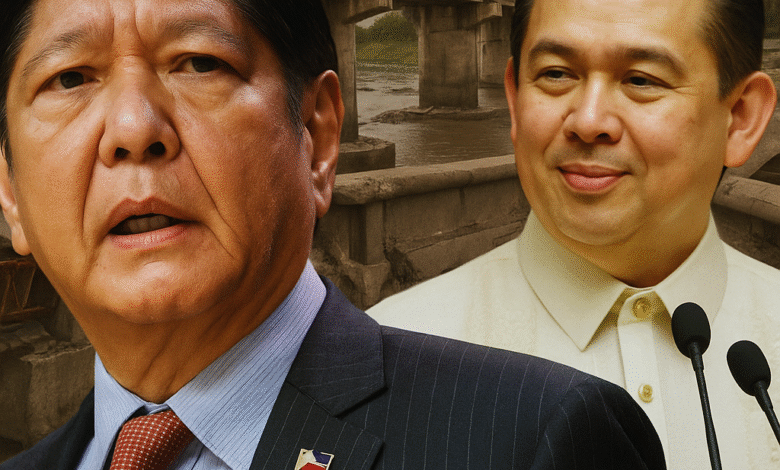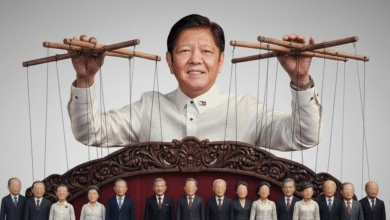
Marcos, Romualdez, and their Great Escape
Martin Romualdez wants history to remember him as a man who made the “ultimate sacrifice.” In a speech before his colleagues, he framed his resignation as House Speaker as an act of selflessness, a way to “save” the chamber from turmoil. The House, complicit as ever, applauded him like he was some tragic hero. But let’s be clear: this is not accountability. This is theater.
Because if command responsibility means anything at all, then Romualdez has his fingerprints on the vault. He signed the General Appropriations Bills of 2023, 2024, and 2025—budgets that contained more than ₱1.022 trillion worth of congressional insertions in the DPWH. These insertions now sit at the heart of the ghost flood control projects scandal. It is not enough to resign from the speakership; he must answer for his role in authorizing the plunder.
And he is not alone. His cousin, President Bongbong Marcos, affixed his own signature to the General Appropriations Acts that made these budgets law. Under his watch, this brazen raid of the treasury happened. If he claims he had nothing to do with it, then what does that make him? A president so weak and so negligent that thieves could carve up the national budget under his nose? That excuse is no different from the convenient amnesia of their family about the billions plundered during the father’s dictatorship. Another great heist, under the watch of the same family.
Some lawmakers tried to sound the alarm. Isidro Ungab, Rodante Marcoleta, Bernadette Herrera, Toby Tiangco, and Kiko Barzaga—names not usually grouped together—dared to stand up, speak out, and question the scheme. And they paid for it. Their budgets slashed, their districts punished, even an ethics case filed. Their courage remains in stark contrast to the cowardice of a chamber that clapped for Martin’s “sacrifice.”
Meanwhile, the supposed cleansing inside the House looks more like whitewash. Leadership posts remain untouched. Bojie Dy, a party-mate and close ally, serves as a new and useful figurehead. Committee chairs are unmoved. The faces may change at the podium, but the machinery of patronage grinds on. Even legal minds warn that this resignation is an optics play: on paper, Martin is gone, but in practice, he can still run the show.
Outside Congress, the Marcos administration knows how divided the nation has become. Big businessmen stand aside cautiously, not wanting to suffer the same fate as the Villars, while the Duterte faithful lick their wounds and bide time to regain Senate power. Even groups once sworn to fight corruption are careful to distance themselves from any “anti-Marcos” label. The Trillion Peso March, set on the anniversary of Martial Law, has organizers insisting it is not a rally against the President. The irony is bitter: people are outraged at corruption but afraid to name the dynasty that enables it.
Observers have seen through the script. As one analyst put it, Romualdez is building “plausible deniability”—absent in small meetings, letting others finalize insertions, so that if the hammer falls, scapegoats can be offered: Chiz Escudero, Grace Poe, Zaldy Co, or more likely just bagmen, district engineers, and contractors. There will be no whales hunted in this fishing expedition.
But the paper trail does not lie. Romualdez signed. Marcos signed. Billions disappeared into ghost projects. This is a story of a historic plunder, and a great escape in the making.
And so the question remains: will this country, once again, let a Marcos-era heist pass with no accountability? Or will we finally insist that command responsibility means exactly what it says—that those in charge must answer for crimes committed under their watch?
Because if Romualdez and Marcos can walk away from this unscathed, then we have learned nothing. We would only be proving that history does not simply repeat itself—it continues.




